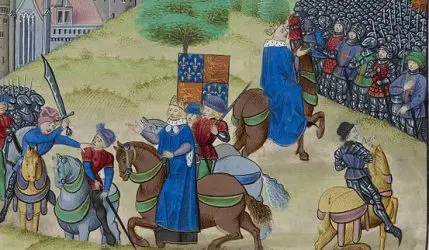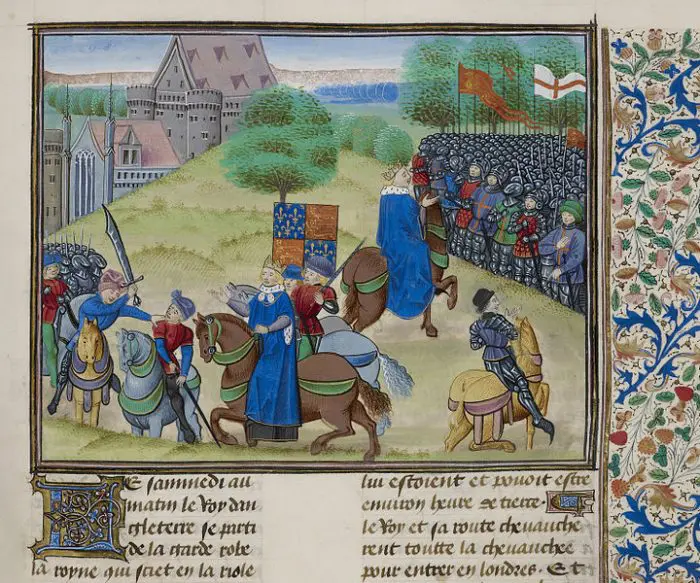
The History of a Peasant Revolt
April 23, 2018
How historians talk about workers’ revolts matters
by Charles Joseph
What causes workers to revolt? Throughout history, workers have protested their conditions with small-scale actions and widespread, sometimes violent rebellions – and for centuries, historians, sociologists, and other scholars have examined the causes of worker revolts.
This post will discuss the English Rising of 1381, also known as the English Peasants’ Revolt, and ask how historians have understood the causes of this major uprising.
In the fourteenth century, many of England’s peasants were tied to the land as serfs. After the Black Death swept across Europe in the 1340s, killing as much as half of the population, England faced a major labor shortage. Farm workers demanded higher wage and better treatment – including an end to serfdom. Just before the 1381 revolt, peasants were hit with several new taxes, prompting a violent uprising in the summer of 1381. Peasants burned tax and court records, stormed London, and demanded reforms from King Richard II, who was only fourteen years old, including an end to serfdom.
But what historical factors caused the revolt? One of the earliest assessments, from chronicler of chivalry Jean Froissart, laid the blame squarely at the feet of the common people. “Never was any land or realm in such great danger as England at that time. It was because of the abundance and prosperity in which the common people then lived that this rebellion broke out.” Unsympathetic to the peasants’ cause, Froissart still reported their grievances. Peasants claimed they were “severely oppressed” and treated like beasts. “This they would not longer bear, but had determined to be free,” Froissart explained, “and if they labored or did any other works for their lords, they would be paid for it.”
In the fourteenth century, Froissart had already identified two central explanations for the revolt: wages and class struggle. By the mid-twentieth century, historians were embroiled in a debate over the revolt’s place in the broader decline of feudalism, defining Froissart’s causes in new terms: economic determinism and contingent class struggle. M.M. Postan, a non-Marxist historical materialist, and Maurice Dobb, argued that conflict arose from economic determinism, with demographics and economic changes like the labor shortage determining the decline. On the other hand, Robert Brenner attributed the revolt to conscious political action, as landowners levied taxes and peasants resisted them.
Historian Rodney Hilton applied a Marxist analysis to the uprising, defining feudalism in terms of its class struggle. For Hilton, feudalism was inherently exploitative, with landowners relying on violence to extract surplus labor from their peasants. In Hilton’s conception, both the lords and the peasants knew the system was rigged, but the lords believed that peasants had been placed in a subservient position by divine decree. Peasants, on the other hand, saw the system as a violation of custom and religion, understanding their situation not in terms of human rights (an idea that would not emerge for several hundred years), but rather through medieval understandings of man’s place in the universe.
Hilton saw the 1381 uprising not as a violent break driven by economics or political pressures but as part of a larger historical process. For decades both before and after 1381, peasants resisted their conditions through both overt and covert means, including tax evasion, litigation, and counter-violence. Hilton thus positioned himself between the arguments for economic determinism and contingent class struggle. Economics and peasant agency drove change, according to Hilton, both in explosive moments like the uprising and in more quotidian feudal interactions.
More recent scholarship has broken out of the dichotomy between economics and class struggle when discussing feudalism by drawing on gender studies, textual analysis, and cultural history to understand the change. As with many debates over historical causality, no single explanation for the English Rising of 1381 suffices. The revolt’s slogan, spoken by leader and radical priest John Ball, makes that clear: “When Adam delved and Eve span, who then was the gentleman?” By undermining a central argument of the lords – that their rights were conferred by blood – with a Biblical reference to the Garden of Eden, the peasants combined religion and class in their attack on feudal privilege. Religion and class were inseparable elements of the uprising, demonstrating the multifaceted causality of the revolt.
As for the peasants in 1381, in the short term, their demands were rebuked. Their leader, Wat Tyler, was killed by London’s mayor, and though King Richard II promised an end to serfdom, he quickly broke his word after the peasants disbanded. However, the poll tax was withdrawn, and over the next century life for England’s peasants slowly improved.
For more on the English Rising of 1381:
Samuel K. Cohn, Jr, Popular Protest in Late Medieval English Towns (Cambridge, 2012).
Richard Dobson, The Peasants’ Revolt of 1381 (Macmillan, 1970).
Rodney Hilton, Bond Men Made Free: Medieval Peasant Movements and the English Rising of 1381, 2nd ed. (Routledge, 2003).
